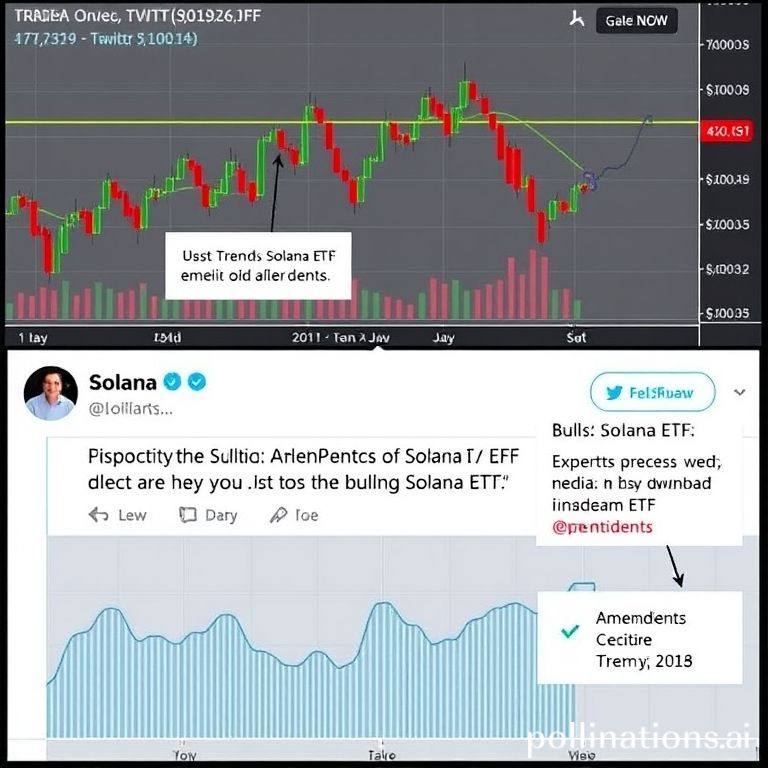
The cryptocurrency market has been abuzz with anticipation since the groundbreaking introduction of Bitcoin and Ethereum spot Exchange-Traded Funds (ETFs) earlier in 2024. These pioneering products not only marked a significant milestone for institutional adoption but also ignited a widespread expectation for further crypto-linked investment vehicles. In the current landscape, all eyes are firmly set on XRP and Solana, which are widely considered to be the next digital assets poised to receive approval from the United States Securities and Exchange Commission (SEC) for their own spot ETFs.
Recent developments indicate that the regulatory process for these new ETFs is accelerating rapidly. As reported on Thursday, September 25, the market was keenly awaiting the final amendments for both XRP and Solana ETF applications. True to predictions, the end of the week saw a significant influx of updated filings from numerous potential issuers, all vying to launch a Solana spot ETF in the US market. This flurry of activity signals a critical phase in the approval journey, indicating strong engagement and progress between the applicants and the regulatory body.
The Inevitable Path to SOL ETF Approval?
The momentum surrounding Solana ETFs became even more pronounced on Friday, September 26. Bloomberg analyst James Seyffart took to social media platform X to share a collection of these updated prospectuses for the spot Solana ETF. Seyffart’s analysis highlighted that this wave of amendments is a clear indicator of active dialogue and substantive movement between the various issuers and the US Securities and Exchange Commission. Such continuous back-and-forth typically precedes a regulatory decision, fueling optimism within the crypto community.
These latest revisions to the applications are not merely procedural; they signify that the launch of a spot Solana ETF is drawing closer than ever before. Echoing Seyffart’s observations, Bloomberg expert Eric Balchunas responded on X, suggesting that investors can now confidently begin a "final countdown" to the approval of these highly anticipated crypto-linked investment products. This sentiment underscores a growing consensus among market analysts that the regulatory hurdles are being systematically addressed, paving the way for eventual approval.
The expectation for these final amendments was not sudden. Bitcoinist had previously reported that ETF Store president Nate Geraci had already forecasted the arrival of the last batch of amendments for Solana ETF applications before the close of that very week. Geraci’s astute prediction was largely based on the SEC’s new generic listing standards, a significant regulatory shift that previously led to the approval of the Hashdex Nasdaq Crypto Index US ETF. This earlier approval served as a precedent, demonstrating the SEC’s evolving approach to crypto-linked financial products beyond Bitcoin and Ethereum.
These "generic listing standards" represent a pivotal change in how crypto-linked ETFs are processed. Essentially, this new framework has opened up a clear pathway for financial firms to issue spot exchange-traded products based on cryptocurrencies other than just Bitcoin and Ether. Critically, under these revised standards, exchanges are now permitted to list qualifying crypto-linked ETFs without the prior requirement of submitting a proposed rule change (known as a 19b-4 filing). This streamlining of the process significantly reduces the regulatory burden and accelerates the timeline for approvals, marking a more flexible and progressive stance from the SEC.
Spot Solana ETF to Feature Staking: A Game Changer
Further solidifying the optimistic outlook, Nate Geraci also made a crucial observation in a Friday post on X, acknowledging the intense activity surrounding S-1 amendments for the spot Solana ETF applications. He identified several prominent potential issuers who have submitted new updates to their filings, including major financial players such as Franklin Templeton, Fidelity, CoinShares, Bitwise, Grayscale, VanEck, and Canary. This broad participation from established financial institutions further lends credibility and weight to the imminent launch of these products.
Perhaps the most significant and exciting detail highlighted by Geraci is the inclusion of staking mechanisms within these new Solana ETF applications. The ability to stake the underlying Solana tokens through the ETF is a notable development. This feature not only provides potential additional yield for investors but also "bodes well" for the future prospects of spot Ethereum (ETH) exchange-traded funds, particularly regarding their own potential for staking components. The SEC's acceptance of staking within a Solana ETF could set a precedent for other proof-of-stake cryptocurrencies, expanding the potential offerings of crypto ETFs.
Staking allows holders of proof-of-stake cryptocurrencies like Solana to earn rewards by participating in the network's validation process. By integrating staking into the ETF structure, issuers are offering a more comprehensive investment product that mirrors the native benefits of holding the cryptocurrency directly, while still providing the regulated, accessible wrapper of an ETF. This innovation could attract a broader range of investors who are seeking yield alongside exposure to the asset's price movements, potentially increasing the appeal and demand for Solana ETFs.
Ultimately, based on these collective developments—the rapid influx of amendments, the SEC's revised listing standards, and the inclusion of staking—ETF expert Nate Geraci maintains a strong conviction. He anticipates that the Securities and Exchange Commission is highly likely to greenlight these SOL-linked investment products within a remarkably short timeframe, specifically within the next two weeks. This timeline suggests that the regulatory process is nearing its conclusion, and the market could soon welcome another significant milestone in mainstream cryptocurrency adoption.
The approval of a Solana ETF would represent a substantial leap forward for the entire digital asset ecosystem. It would not only legitimize Solana further as a mainstream investment asset but also signal a broader acceptance by traditional finance of a wider array of cryptocurrencies. This expansion could open doors for other altcoins to follow suit, fostering greater liquidity, stability, and institutional participation across the crypto market. As the "final countdown" begins, the implications of Solana's ETF journey extend far beyond just one asset, promising a new era for crypto investments.
